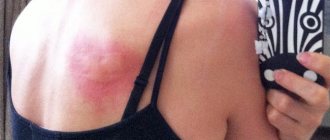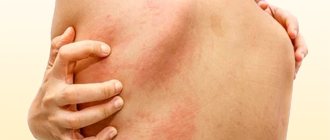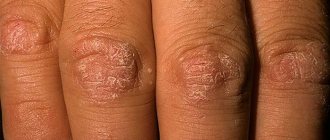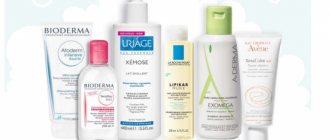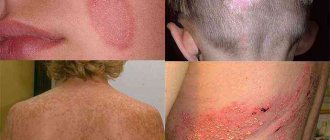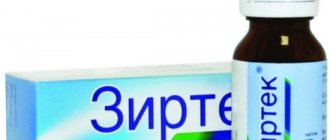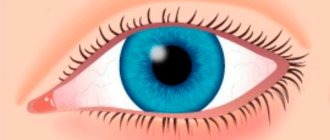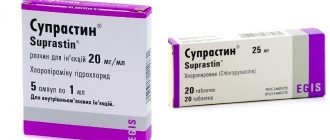Many are convinced that an allergic reaction on the skin to cosmetics occurs exclusively in people with hypersensitive skin. However, this statement is misleading, as everyone can develop an allergy to cosmetics on the face.
After all, in essence, this is an immune response to foreign proteins, manifested primarily by swelling and itching. Most often, allergies can occur among the fair sex, since they are the ones who love cosmetics.
Of course, it is impossible to completely give up cosmetics, but by adhering to some recommendations and knowing what to do if you have allergic symptoms, you can use the drugs.
Causes of allergies
The main reasons for the body's acute reaction during facial skin care are determined by the components included in the product and the characteristics of the patient's skin type. However, allergists and immunologists identify the following provoking factors:
- Hormonal background. The level of certain hormones is directly related to the body’s tendency to allergic reactions. Women feel this especially acutely during pregnancy.
- Metabolism. The better the metabolic processes, the lower the tendency to allergies, since dangerous substances leave the body much faster. And with a weak metabolism, dangerous components linger longer in the bloodstream, so they have time to provoke allergies.
- Immunity. If the body's defenses are normal, then it is able to cope with the influence of allergens. A weakened immune system leads to allergies even to proven remedies.
- Climate and season. In some cases, an allergic reaction on the face can only occur under unfavorable weather conditions (severe frost or heat).
- Poor nutrition. The protective functions of the skin are reduced due to weakened immunity, which occurs due to a deficiency of vitamins and minerals.
Under the influence of these factors, not only a new cosmetic product, but also one that has already been used several times can lead to allergies on the face.
Allergy to shampoo
It is not uncommon to meet a person who has ever encountered the problem of an allergy to detergents. Symptoms of an allergy to shampoo (photo 7) can be quite varied. Some people start to have an itchy head, others notice hair loss. Each person's reaction is individual. Such problems arise due to the high content of aggressive substances in soap accessories.
Adults can accurately notice that something is wrong with the body, but it is not always possible to notice in time that an allergy to soap has had an effect on the baby’s body. In this case, you should seek help from a specialist.
You should choose a shampoo for children on the advice of a dermatologist or do it yourself, but take into account many factors. It should not contain parabens and sulfates. They are the culprits of allergies to shampoo.
Allergy to shower gel
Every person wants to be clean and exude a pleasant smell. Therefore, shower gel is becoming a more popular means of cleansing the body. Using such products is very pleasant, but it becomes impossible if you are allergic to the shower gel (photo 8). If you experience itching, redness, sneezing and the inability to breathe normally, you should immediately remove the hygiene product from your arsenal. To completely get rid of the problem, you will have to take a course of antihistamines and visit a dermatologist.
Some may notice that toothpaste allergy symptoms appear when brushing their teeth. In this case, not only the outer coverings of the human body, but also the internal organs may be damaged. Since absorption of substances occurs quickly, allergies can develop very quickly. The first symptom that may appear will be swelling and dermatitis around the mouth. Then an allergy may appear in the eyes, manifested by redness of the mucous membrane. More serious problems may also arise: pulmonary edema, shortness of breath, disruption of internal organs, and so on.
Allergy to soap
Many people ask themselves the question: why does the body’s aggression towards care products occur? It is very difficult to answer this question. As mentioned earlier, the human body has various structures and systems that can be susceptible to certain substances. Allergy to soap (photo 9) is no exception.
It manifests itself in almost the same way as other substances. The skin and mucous membranes suffer, and the integrity of the skin is compromised. Treatment is applied by a specialist, but if it is carried out independently, it must contain drug therapy.
Store-bought soap contains many chemicals. Such as: fragrances, dyes and aggressive components. To avoid allergies on the body, you need to understand what means will help avoid this.
There are also frequent cases of reactions to an irritant - an allergy to lenses . It affects mainly those who have vision problems, but do not want or for some reason cannot wear glasses. Everyone knows that wearing lenses is very convenient, they do not require wiping or careful handling, and cannot break or be damaged in any situations. But they can cause discomfort and rejection due to the material from which they are made or the substance in which they are contained.
Symptoms of an allergy to lenses may be the following: increased secretion of tear fluid, burning and itching, redness of the membrane of the eye and swelling around the eye area.
To get rid of these unpleasant moments, you need to remove the lenses and rinse them with water, drip your eyes with an antihistamine and stop wearing lenses for a while. Nevertheless, to solve the problems listed above, it is worth contacting a specialist who will help solve the problem based on his experience and knowledge.
Symptoms
An allergy on the face to various creams most often does not take long to occur and occurs very quickly after contact with a dangerous substance. But in some cases, an undesirable reaction may appear only after 48 hours. Typically, all skin reactions provoked by external irritants are divided into 2 groups: allergic and simple contact dermatitis.
When an allergy to a cream occurs, the most common symptoms are:
- redness and peeling at the site of application;
- the skin on the face is hot and itchy;
- a small rash and blisters appear;
- eyes and eyelids swell.
In this case, the development of irritation and rashes can occur both at the point of contact and throughout the skin of the face and/or neck. And if contact with the allergen is not eliminated in a timely manner, anaphylactic shock may develop. Contact dermatitis may not make itself felt for a long time, and its first signs will appear only after harmful substances accumulate in large quantities during prolonged use of the cream.
Typically, the symptoms of atopic or contact dermatitis resemble standard allergies, but they occur with different intensities.
Allergies when using face cream
Allergies to face creams are quite common. A reaction can occur after using any cosmetic product, including preparations for tightening the eyelids and skin around the eyes.
Every woman regularly uses moisturizing and tightening products for her skin. Thanks to the huge range of cosmetic products, you can easily choose a face cream and hair removal cream according to your individual requirements.
However, it should be remembered that allergies manifest themselves in different forms and can develop rapidly in response to the use of eyelid creams and the skin around the eyes. Therefore, care must be taken when using them. Otherwise, allergic manifestations will have to be treated with medications.
Diagnostics
When an allergy to a cream occurs, it is not enough to simply refuse to use a particular product. Modern facial cosmetics are multi-component and a common reason for the recurrence of an allergy to another product is that the allergen that caused the allergy for the first time has not been identified.
You should definitely visit an allergist and undergo a series of skin tests to identify the allergen that is part of the cream. It is advisable to carry out such an examination especially in a child. But the symptoms of the disease in adults are no less dangerous and also require careful diagnosis.
Before sending a patient for allergy tests, the doctor first performs a thorough physical examination and collects an anamnesis. All this helps him select several components that most likely had a negative effect on the body. After which they are injected in small doses under the patient’s skin. If after a while skin irritation, itching or swelling is detected in this area, then it is likely that this substance is an allergen.
Treatment
To avoid serious complications, treatment should be started without delay at the first signs of allergy. When an allergy to a cream occurs, sometimes it is enough to remove the remaining cream from the face and not use it again. But often it is necessary to use medications to relieve an allergic reaction.
Antihistamines for oral administration
If an allergic reaction occurs, it is necessary to immediately begin treatment with antihistamines, since such drugs can quickly relieve pathological symptoms and improve overall well-being. When choosing antihistamines, you should choose third-generation drugs (Telfast, Fexadin, Zyltec). Most of them begin to act instantly and have fewer side effects.
However, with severe allergies, they do not always justify themselves, so there is a need to resort to corticosteroids (Dexamethasone, Prednisone). The effect of the medicine will occur faster if it is used parenterally.
Topical products
Along with oral antihistamines, it is recommended to use topical medications (ointments, creams, gels). Such remedies are hormonal and non-hormonal. The latter are considered safer because they can be used for a long time, and they practically do not cause unwanted side reactions (Videstim, Actovegin).
But usually you have to wait 2-3 days for the effects of using ointments of this type. And in case of a severe allergic reaction, quick action is needed. It can be provided by hormonal ointments (Metizolone, Momederm). But such drugs cannot be used for a long time, so as not to develop addiction to them.
Prevention
If you have previously experienced an allergy to the cream, then in order to avoid problems with your facial skin in the future, you need to follow these simple recommendations:
- It is necessary to carefully study the substances included in the composition for the presence of previously identified allergens.
- Before purchasing, you should pay attention to the expiration date of the product, and monitor storage conditions at home. The cream should also be used within 6-12 months after opening.
- Use cosmetics or care products that are suitable for your skin type.
- All new cosmetics must be tested first. Apply a small amount of cream to the skin in the elbow area and leave for 30 minutes. After washing off the product, you should monitor the area for 24 hours. If during this time no itching, hyperemia or swelling appears, then the cream can be applied to the face.
If possible, you should buy skincare cosmetics that are marketed as hypoallergenic. Typically, manufacturers of such creams try to reduce the number of potential allergens and other harmful components in the composition.
Selection of cosmetics
If this is not the first time that cases of allergy to cream on the face have occurred, then a woman can protect herself by carefully choosing cosmetics. When choosing basic care, you need to pay special attention to the composition of the products, for example the following parameters:
- Parabens. If they are present in the composition, this greatly increases the likelihood of allergic reactions. It is safer if other gentle components are used as preservatives.
- Fragrance. If the cream has a pronounced intrusive odor, then it is better for allergy sufferers not to purchase it.
- Natural plant extracts. On the one hand, this may be the strength of the cream, but for people prone to allergies, these components can cause a number of problems.
- Essential oils. Such components in the composition should also alert allergy sufferers.
If a woman develops allergies more and more often, then pharmaceutical cosmetics should become a priority for her. Brands such as La Roche-Posay, Bioderma, Avene develop products specifically for problematic skin prone to allergies and atopic dermatitis. Creams of these brands will help not only eliminate the consequences of the rash that occurred during the initial allergic reaction, but will also protect against its occurrence in the future.
Face and body skin care cosmetics quite often cause allergies. This is due to the fact that manufacturers use a variety of chemicals that allow products to be stored longer, as well as have an attractive consistency and smell. You need to carefully choose face creams and buy only those whose safety is beyond doubt.
Symptoms
To effectively combat an allergic reaction to cream, especially for depilation, it is important to know the symptoms of the disease.
The most common manifestations are:
- redness of the skin, which can spread to the neck and scalp;
- the presence of a rash in the form of pustules, papules and ordinary rashes, especially after facial masks and depilation;
- Sometimes erosive formations may occur, which require specific treatment;
- the presence of itching, which can be unbearable, even scratching. This condition causes particular discomfort for a small child. However, it should be remembered that this should not be done under any circumstances, since the risk of infection is high, which complicates the symptoms of the disease;
- over the entire surface of the body, the area under the eyes is especially sensitive; a strong burning sensation may be noted in this part of the face;
- 2-3 days after using the face and eyelid cream, peeling of the skin may appear;
- the most dangerous is edema, which can develop with varying degrees of intensity. Most often, swelling occurs around the eyes and eyelids. In more severe cases (allergy to baby cream), angioedema may develop, requiring emergency medical attention.
The primary symptoms of the disease appear a few minutes after applying the cream to the face or depilation area. First of all, a burning sensation is noted, then hyperemia of the skin around the eyes and eyelids appears. Then rashes and swelling are noted.
If these symptoms increase, an urgent visit to a doctor is required, who will select the necessary treatment. In the case where symptoms are observed in a child, treatment is recommended under the supervision of a pediatrician.



